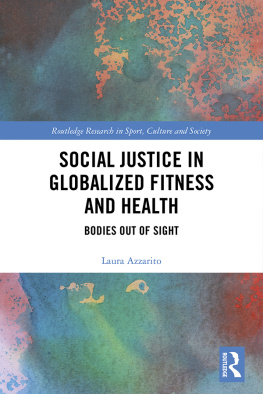Social Justice in Globalized Fitness and Health
In todays neoliberal times, thinking about fitness and health is dominated by the medias narratives of fit bodies, which are presented and circulated in society as valued bodies. Outside that mainstream view, however, there are many people labeled bodies-at-risk: those who deviate from perceived norms of size, shape, race, social class, and gender.
Social Justice in Globalized Fitness and Health draws attention to how neoliberal ideologies impacting the body overlook the intersection of class, gender/sex, and race that informs how young, ethnic minoritized people embody and negotiate normative discourses of fitness and health. Indeed, through the lens of critical race theory (CRT), post-feminism, and postcolonialism, Azzarito highlights young, ethnic minoritized peoples struggles to find a culturally relevant sense of self.
Arguing for the need to found educational spaces where young, ethnic minoritized people can recognize themselves, resist and counter-narrate negative stereotypes, and self-represent to the public in affirmative ways, Social Justice in Globalized Fitness and Health will appeal to students and researchers interested in fields such as physical culture, education, sport sociology, qualitative methods, and cultural and visual studies, as well as scholars and practitioners of physical education and health in schools.
Laura Azzarito is Program Director of the Graduate Program in Physical Education Pedagogy and Physical Culture and Co-Director of the Visual Research Center for Education, Art, & Social Change at Teachers College, Columbia University, New York.
Routledge Research in Sport, Culture and Society
Surfing and Sustainability
Gregory Borne
Women, Sport and Exercise in the Asia-Pacific Region
Domination, Resistance, Accommodation
Gyozo Molnar, Sara N. Amin and Yoko Kanemasu
Gender Diversity in European Sport Governance
Edited by Agnes Elling, Jorid Hovden and Annelies Knoppers
Figurational Research in Sport, Leisure and Health
Edited by Dominic Malcolm and Philippa Velija
The Historical Sociology of Japanese Martial Arts
Ral Snchez Garca
Sport in Scandinavia and the Nordic Countries
Edited by Ken Green, Thorsteinn Sigurjnsson and Eivind srum Skille
Critical Research in Sport, Health and Physical Education
How to Make a Difference
Edited by Richard Pringle, Hkan Larsson and Gran Gerdin
Soccer and the American Dream
Ian Lawrence
Social Justice in Globalized Fitness and Health
Bodies Out of Sight
Laura Azzarito
For more information about this series, please visit: www.routledge.com/sport/series/RRSCS
Social Justice in Globalized Fitness and Health
Bodies Out of Sight
Laura Azzarito
First published 2019
by Routledge
2 Park Square, Milton Park, Abingdon, Oxon OX14 4RN
and by Routledge
52 Vanderbilt Avenue, New York, NY 10017
Routledge is an imprint of the Taylor & Francis Group, an informa business
2019 Laura Azzarito
The right of Laura Azzarito to be identified as author of this work has been asserted by her in accordance with sections 77 and 78 of the Copyright, Designs and Patents Act 1988.
All rights reserved. No part of this book may be reprinted or reproduced or utilized in any form or by any electronic, mechanical, or other means, now known or hereafter invented, including photocopying and recording, or in any information storage or retrieval system, without permission in writing from the publishers.
Trademark notice: Product or corporate names may be trademarks or registered trademarks, and are used only for identification and explanation without intent to infringe.
British Library Cataloguing-in-Publication Data
A catalogue record for this book is available from the British Library
Library of Congress Cataloging-in-Publication Data
A catalog record has been requested for this book
ISBN: 978-1-138-05989-4 (hbk)
ISBN: 978-1-315-16331-4 (ebk)
Typeset in Times New Roman
by Wearset Ltd, Boldon, Tyne and Wear
To my daughter Vivien Rose Azzarito-Thompson.
Amore, ricordati sempre le parole di Dr. Martin Luther King, Jr.:
Power at its best is love implementing the demands of justice. Justice at its best is love correcting everything that stands against love.
(Rev. Dr. Martin Luther King, Jr.)
Ti voglio tanto bene. Tua mamma
Contents
We do not pay attention to what we cannot see. Especially in todays society, where the eye is central in Western culture (Jenks, 1995), how people come to understand body knowledge and difference is largely based on vision. As long as the public health agenda continues to overlook the sociocultural and emotional aspects of young peoples bodies, ethnic minoritized young peoples own perceptions, meaning-making, and expressions of their body experiences will remain out of sight and marginal in the normative, dominant, and regulative way of seeing in fitness and health. The objectification of the body alters the way the body is perceived. Todays widespread performative culture of the fit body, with its overemphasis on body weight, shape, and size, not only homogenizes and disciplines young peoples bodies to specific bodily norms (Evans & Davies, 2014) but also generates a partial, one-sided view of the body. In particular, for ethnic minoritized young people, whose self-concepts are defined and framed by current health imperatives through a damaging lensa view constructed upon the body-at-deficit dominant discoursethe possibility of fitting a positive image, seeing themselves in affirmative ways, developing a positive self-concept, and feeling good about their bodies is denied by a pervasive distorted societal image of their bodies. Bodies Out of Sight argues for the need to research and theorize ethnic minoritized young peoples bodies as being culturally encoded by upbringings, contexts, opportunities, and access. The book is about students who are labeled as bodies-at-risk, those who deviate from norms of size, shape, race, social class, and gender, and thus, negotiate fitness and health normative practices in difficult, complicated ways. The main aim of the book is to bring bodies out of sight back into the light, to uncover their own ways of seeing their identities, and to theorize their differences and their struggles for social justice, thus shining light onto their bodies.
In line with the current public health agenda, the rise of high-stakes testing in school physical education (PE), driven by a market-focused approach, marks many ethnic minoritized young peoples bodies as deviating from standardized norms of size and shape, stripping away their right to see themselves and make sense of their bodies in culturally relevant ways. In these neoliberal times of accountability, control, and surveillance (Desai & Darts, 2016), such scrutiny, standardization, and classification of the body implicitly position ethnic minoritized young peoples bodies as being out of sight of the performative culture of the body governed by neoliberal principles and ideals of self-compliance, self-discipline, and self-actualization. The current dominant discourse of healthism, driven by neoliberal globalization, glosses over cultural differences and, moreover, denies the roles of culture and embodiment, implicitly placing ethnic minoritized young people as bodies out of sight: hidden identities in todays society that are buried by ongoing multiple and complex institutionalized forms of racism, sexism, ableism, and social classism that frame and constrain their physicality. There is an urgent need to look beyond the conventional classification, management, and standardization of the body sustained by the health risk discourse, which reinforces a negative image of ethnic minoritized young peoples bodies in society. In this book, I challenge the objectification of the body that privileges a Cartesian split between the self and the body and reject the model that produces an isolated body, a body detached from the external world. Instead, I advocate for the importance of attending to sociocultural and emotional aspects of ethnic minoritized students ways of experiencing their bodies and recognize the dynamic relationships among neoliberal globalization, culture, difference, embodiment, individual consciousness, and critical reflection as being crucial to young peoples affirmative construction of their embodiment in physical culture.










